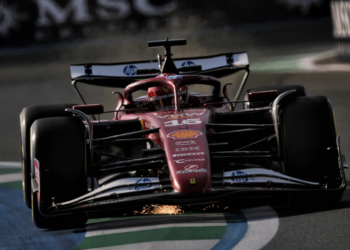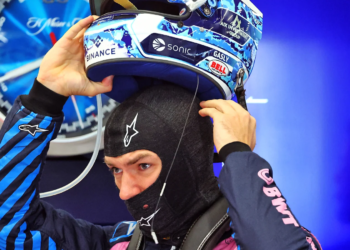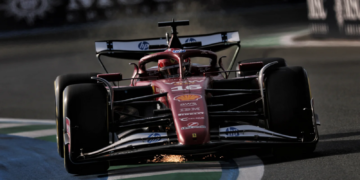The McLaren Formula 1 Team will trial the use of recycled carbon fibre at the United States Grand Prix with the hope that the practice will prove integral to reducing CO2 emissions.
The recycled material, developed in partnership with V Carbon, will first feature on the cockpit branding panels of the MCL60 in Austin.
McLaren intends to keep using the recycled material for the remainder of the 2023 F1 season if the United States GP trial is successful. The view is then to explore options to expand usage for future projects.
McLaren first pioneered the use of a full carbon fibre monocoque in F1 machinery in 1981 with John Barnard’s MP4/1.
Lightweight and robust, the carbon fibre is now a mainstay in the sport, but that comes with environmental caveats.
The manufacture of an F1 car, including the fabrication of carbon fibre components, is one of the largest contributors to a team’s overall carbon footprint.
Studies currently suggest that around 30% of all carbon fibre ends up as waste during the production process. As F1 continues to push for carbon-neutrality by 2030, McLaren now hopes that it can build a “fully circular” car by the same year.

“We’re proud to team up with V Carbon to lead the charge in sustainable materials, running with recycled carbon fibre at the Austin GP,” said McLaren COO Piers Thynne.
“The potential future application of recycled carbon fibre is hugely exciting. V Carbon offers up to 85% of carbon fibre’s original strength, making it strong enough for a variety of applications in F1, and beyond.
“We will continue to work closely with the FIA, F1 and fellow teams to help accelerate change.”
“Developing a fully circular F1 car is our moonshot,” McLaren Director of Sustainability Kim Wilson added. “We know that innovating in this space has the potential to make a large contribution to achieving our ambitious sustainability goals.
“Using recycled carbon fibre in key parts of the F1 car at this year’s US GP and analysing their performance on the track is a vital step towards reducing the overall GHG [greenhouse gas] emissions of our car manufacture.”
The team claims that if just 1% of carbon fibre manufactured globally in 2022 was recycled, it would save the equivalent of half of the racing team’s emissions that year.









